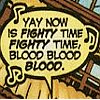
I am back from my reading! Which went awesomely, by the way. It's weird - the idea of going up to a stranger and asking for directions makes me start to hyperventilate, but I have no problem at all with public speaking, once it's a group larger than about ten or so. So I was a little bit nervous about this (and I think I was bright scarlet the whole time, I have no control over my blushing), but mostly it was a lot of fun. All the other Levinthal students were great (omgggg some of the poets, so awesome), and I got several very flattering compliments about my reading/story. All in all, a smashing success!
Here is the except that I read. It is from one of the short stories I've been working on this quarter, Drowning Thessolonike, which is about a brother and sister meeting for the first time after their father dies in prison. Fun times!
They talk about Michael’s job as a dermatologist – more embarrassing rashes than life-threatening surgeries – and the skin cancer conference he’s in town to attend – boring speakers, but good swag at the demo booths – and Aubrey tells him a few jokes about the sociology department at the university, and that gets them through most of the meal. They’re onto coffee and picking at the leftover breadsticks before Michael starts asking her questions about their father again.
“I just want to know more about what he was like,” Michael says, taking another sip of wine. Aubrey notes absently that he’s on his third glass now. “You have to have some good stories about him.”
She sucks in a breath, feels her shoulders tense, but after a few seconds of sitting there she relaxes again. This is easier than it seems. It’s the same kind of thing her teachers always asked in class when she was younger, when they wanted to give them essays they didn’t have to think about. Write about a family trip. A day with a parent. Your favorite memory. She’d kept a mental list of stories that were acceptable, just true enough to be interesting but with anything censored out that would have led to awkward questions. It wasn’t like anyone was going to notice if she reused the same stories from year to year. It wasn’t like Michael would be able to tell the difference now.
“The summer I was seven,” she says steadily, “Dad decided one day he needed to teach me how to fish. So he stole his buddy Charlie’s extra rod and threw his tackle box in the back of the pick-up and we drove up to Cochiti. Dragged me out of bed at three in the morning, drove 50 miles to get to the lake, and we can’t catch a damn thing. He’s sitting there, pounding back Coronas and getting more and more pissed, and I’d rather be playing in the mud, but he’s going to teach me to fish, damnit. He keeps saying that.”
She pauses. It’s always hard to get the inflections right on this part of the story, to convince whoever she’s telling that it’s actually supposed to be funny. She’s had a lot of practice at it, though. “So finally he just loses it. He stands up and and says “fishing this way is for pansies,” and takes Charlie’s .22 out of the back seat of the truck and just starts shooting into the water, at all those fish he’s sure are right there. Five different people called the cops on us, and we got banned from the park. And we still didn’t catch any fish.”
She doesn’t usually mention the fight that he and her mother got into when they got home and she found out what he’d done. That part wasn’t really very funny.
Not that Michael’s laughing in the first place. Just kind of staring at her, eyes a little wide, like he’s not quite sure how he should be responding. “You have to be making that up,” he says finally, and a small sarcastic voice in her head says of course, what do you expect from a dermatologist from Cleveland. But that isn’t really fair.
“I swear on our father’s grave,” she replies instead. “He was kind of a crazy drunk. I haven’t even told you about the time he set the juniper bushes in the yard on fire trying to clear weeds. I’ve got a few stories I can tell you.”
This, Aubrey thinks, is where the whole thing starts to fall apart. Because she means it as another joke, gosh, wasn’t dad wacky, but she can tell as soon as she says it that all she’s done is make Michael feel sorry for her. He’s back to folding his napkin fastidiously and not quite meeting her eyes and she just – she’s never been able to handle other people’s pity. It makes her feel weak, out-of-control, puts her on the defensive, and that’s not quite Michael’s fault but he doesn’t have to sit there looking so damn disappointed.
“Forget about it,” she says, folding her arms tight across her chest. “It doesn’t matter.”